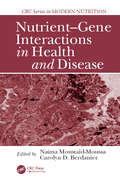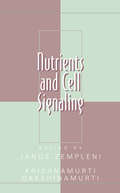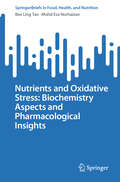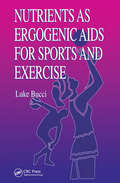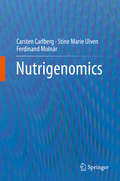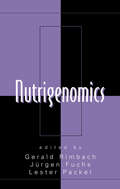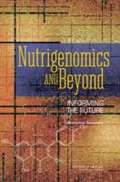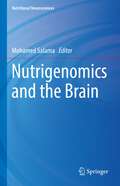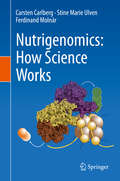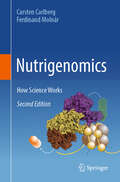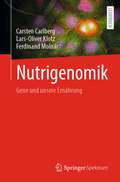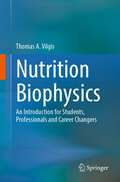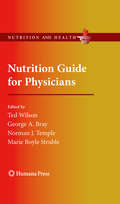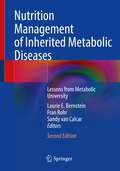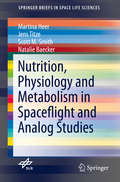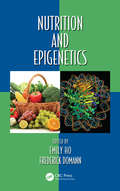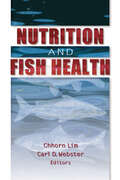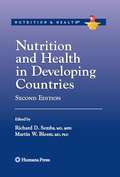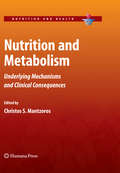- Table View
- List View
Nutrient-Gene Interactions in Health and Disease
by Carolyn D. Berdanier Naima Moustaid-MoussaWe have come to realize that optimal nutrient intake is determined by very specific genetic messages. This realization has led to an entirely new approach to understanding nutrition - the exploration of nutrient effects on gene expression. Edited by leading experts in the field, Nutrient-Gene Interactions in Health and Disease provides an
Nutrients and Cell Signaling
by Janos ZempleniCell signaling is at the core of most biological processes from the simplest to the most complex. In addition to unicellular organisms possessing the essential ability to receive inputs with regard to nutrient availability and noxious stimuli, the cells in multicellular organisms require signaling from adjacent, as well as distant cells to maintain
Nutrients and Nutraceuticals for Active & Healthy Ageing
by Seyed Mohammad Nabavi Grazia D’Onofrio Seyed Fazel NabaviThis book focuses on the nutrients and nutraceuticals that promote active and healthy ageing – recently defined by the WHO as the process of development and maintenance of functional capacity that allows well-being at an advanced stage of life. There has been a rapid rise in the use of nutritional interventions as well as specific nutraceuticals in the management of multifactorial aspects of clinical health outcomes. Written by leading experts this book comprehensively discusses the various ageing phenotypes and age-related diseases. It also assesses the nutritional status of the elderly and the various epidemiological factors that influence it. It reviews the role of dietary fiber in disease-free and fully functional ageing. Further, the book explores the benefits of polyphenols, which are secondary plant metabolites, in protecting against cancer, cardiovascular diseases, and various neurodegenerative diseases.
Nutrients and Oxidative Stress: Biochemistry Aspects and Pharmacological Insights (SpringerBriefs in Food, Health, and Nutrition)
by Bee Ling Tan Mohd Esa NorhaizanOxidative stress plays a prominent role in the development of numerous human diseases associated with animal-based protein, high-carbohydrate diets and excessive fat consumption. Obesity represents the main risk factor for chronic diseases such as cardiovascular disease, cancer, and type 2 diabetes. Extensive research highlights the detrimental impacts of diets high in saturated fat and refined carbohydrates. Type 2 diabetes, cardiovascular disease and obesity are attributed to the sedentary lifestyles, overconsumption of foods high in saturated fats and carbohydrates, and the saturation of nutrient storage. Indeed, the effects of oxidative stress are associated with the absolute quantity and the type of macronutrients; both of these aspects contribute to oxidative stress and may favor the development of obesity-associated diseases and obesity. Nonetheless, the underlying mechanisms of nutritionally mediated oxidative stress are complex and poorly understood. The literature reported on nutritionally mediated oxidative stress and the role of diets in oxidative stress-induced diseases has not well been compiled in a singular source. “Nutrients and Oxidative Stress: Biochemistry Aspects and Pharmacological Insights” explores how dietary choices dampen or exacerbate inflammation and oxidative stress. The implications of oxidative stress in glucose metabolism and adipocyte and obesity-associated non-communicable diseases are also discussed in this brief. Several issues linked to nutritionally mediated oxidative stress, including high carbohydrates, high animal-based proteins, and excessive consumption of fats and oxidative stress, and molecular mechanisms of oxidative stress-induced diseases are covered. The role of diets in oxidative stress-induced diseases is also discussed. By summarizing all the literature in one place, this work provides a cohesive representation of the information and practical reference on the underlying mechanisms of nutritionally mediated oxidative stress involved in the prevention of chronic diseases. The work provides a better understanding of the nutritionally mediated oxidative stress and the molecular mechanisms of oxidative stress in the development of chronic diseases and obesity.
Nutrients as Ergogenic Aids for Sports and Exercise (Nutrition In Exercise And Sport Ser. #2)
by Luke R. BucciNutrients as Ergogenic Aids for Sports and Exercise discusses the growing body of information regarding the enhancement of human physical performance by dietary manipulations through ergogenesis. It balances the application of nutritional manipulations between overzealous promoters and recalcitrant cynics. By offering a thorough, comprehensive and up-to-date review of what is known about ergogenic effects of nutrients on humans, it bridges the gap between common usage and scientific knowledge. Nutrients as Ergogenic Aids for Sports and Exercise covers in detail many popular product ingredients not considered elsewhere. It illustrates areas awaiting future research, and offers suggestions for avoiding the pitfalls of performing ergogenesis research.
Nutrients, Dietary Supplements, and Nutriceuticals
by Victor R. Preedy Ronald Ross Watson Joe K GeraldNutrients, Dietary Supplements, and Nutriceuticals: Cost Analysis Versus Clinical Benefits provides the most current, concise, scientific appraisal and economic analysis (costs vs. benefit) of nutritional supplements and bioactive components (nutriceuticals) of foods in improving the quality of life. It fills a much-needed gap to have a single volume provide a synopsis of cost analysis of dietary supplements and nutritional products as well as therapies for treatment and prevention of disease. Chapters include emerging fields of science and important discoveries relating to early stages of new nutriceuticals in cancer prevention, prior to clinical trials. Written by international and national standing leaders in the field, Nutrients, Dietary Supplements, and Nutriceuticals: Cost Analysis Versus Clinical Benefits is essential reading for nutritionists, pharmacologists, health care professionals, research scientists, cancer workers, pathologists, molecular and cellular biochemists, physicians, general practitioners as well as those interested in diet and nutrition in disease resistance via immune regulation.
Nutrigenomics
by Carsten Carlberg Ferdinand Molnár Stine Marie UlvenThe fascinating area of Nutrigenomics describes this daily communication between diet, food and nutrients, their metabolites and our genome. This book describes how nutrition shapes human evolution and demonstrates its consequences for our susceptibility to diseases, such as diabetes and atherosclerosis. Inappropriate diet can yield stress for our cells, tissues and organs and then it is often associated with low-grade chronic inflammation. Overnutrition paired with physical inactivity leads to overweight and obesity and results in increased burden for a body that originally was adapted for a life in the savannas of East Africa. Therefore, this textbook does not discuss a theoretical topic in science, but it talks about real life, and our life-long "chat" with diet. We are all food consumers, thus each of us is concerned by the topic of this book and should be aware of its mechanisms. The purpose of this book is to provide an overview on the principles of nutrigenomics and their relation to health or disease. We are not aiming to compete with more comprehensive textbooks on molecular nutrition, evolutionary biology, genomics, gene regulation or metabolic diseases, but rather will focus on the essentials and will combine, in a compact form, elements from different disciplines. In order to facilitate the latter, we favor a high figure-to-text ratio following the rule "a picture tells more than thousand words". The content of this book is based on the lecture course "Nutrigenomics", which is held since 2003 once per year by Prof. Carlberg at the University of Eastern Finland in Kuopio. The book is subdivided into three sections and twelve chapters. Following the "Introduction" there are sections on the "Molecular genetic basis" and the "Links to disease", which take a view on nutrigenomics from the perspective of molecular mechanisms or from the causes of metabolic diseases, respectively. Besides its value as a textbook, Nutrigenomics will be a usefull reference for individuals working in biomedicine.
Nutrigenomics (Oxidative Stress and Disease)
by Martin GardnerNutritional genomics, also referred to as nutrigenomics, is considered one of the next frontiers in the post-genomic era. This book features the latest research on the role of oxidants and dietary antioxidants in the modulation of gene expression, aging, immune function, neuroprotection, and vascular heath. It covers the relationship between oxidants, antioxidants, and gene expression, as well as new molecular techniques for the study of redox-regulated signal transduction. It summarizes the molecular mechanisms of phytochemicals and trace elements, emphasizes the impact of variations in the human genotype on individual responses to nutrients, and offers a summary of the effect of lipid and water soluble antioxidants and fatty acids on gene expression in cultured cells, laboratory animals, and humans.
Nutrigenomics AND Beyond: INFORMING THE FUTURE
by Institute of Medicine of the National AcademiesThe National Academies Press (NAP)--publisher for the National Academies--publishes more than 200 books a year offering the most authoritative views, definitive information, and groundbreaking recommendations on a wide range of topics in science, engineering, and health. Our books are unique in that they are authored by the nation's leading experts in every scientific field.
Nutrigenomics and the Brain (Nutritional Neurosciences)
by Mohamed SalamaDr. Mohammed Salama is Atlantic senior fellow for Equity in brain health at the Global Brain Health Institute (GBHI) and Associate professor at the Institute of Global Health and Human Ecology at the American University in Cairo (AUC). He established the first Translational Neuroscience Unit in Egypt. Mohamed’s collaborative research led to establishing the Egyptian Network for Neurodegenerative Disorders Mohamed was selected as a SOT Global Senior Scholar in 2013 and Translational/bridging awardee in 2016. He was awarded by Parkinson’s and Movement Disorders Foundation (PMDF) for his continued research in neurodegeneration. Recently, Mohamed and his colleagues succeeded in drafting the first Reference Egyptian Genome and collaborating with other colleagues to start a national cohort (A Longitudinal Study of Egyptian Health Aging [AL-SEHA]).
Nutrigenomics: How Science Works
by Carsten Carlberg Ferdinand Molnár Stine Marie UlvenThe fascinating area of Nutrigenomics describes this daily communication between our diet and our genome. This book describes how nutrition shapes human evolution and demonstrates its consequences for our susceptibility to diseases, such as diabetes and atherosclerosis. Inappropriate diet can yield stress for our cells, tissues and organs and then it is often associated with low-grade chronic inflammation. Overnutrition paired with physical inactivity leads to overweight and obesity and results in increased burden for a body that originally was adapted for a life in the savannahs of East Africa. Therefore, this textbook does not discuss a theoretical topic in science, but it talks about real life and our life-long “chat” with diet. We are all food consumers, thus each of us is concerned by the topic of this book and should be aware of its mechanisms.The purpose of this book is to provide an overview on the principles of nutrigenomics and their relation to health or disease. The content of this book is based on the lecture course “Nutrigenomics”, which is held since 2003 once per year by Prof. Carlberg at the University of Eastern Finland in Kuopio. The book represents an updated but simplified version of our textbook “Nutrigenomics” (ISBN 978-3-319-30413-7). Besides its value as a textbook, “Nutrigenomics: how science works” will be a useful reference for individuals working in biomedicine
Nutrigenomics: How Science Works
by Carsten Carlberg Ferdinand MolnárNow in its second edition, this concise textbook provides an overview of the field of nutrigenomics, a topic at the intersection of nutrition and genetics that explores how dietary molecules interact with our genome and epigenome to influence health and disease. Substantially updated and expanded, the book offers a fresh perspective on how diet has shaped human evolution and our susceptibility to conditions such as type 2 diabetes and cardiovascular disease. The 11 chapters cover a wide range of topics, beginning with an overview of the role of nutrients in health and disease, basic mechanisms of nutrient sensing and nuclear receptors, and the impact of epigenetic regulation on health. Readers will discover how chromatin-modifying enzymes and energy status-sensing kinases play critical roles in signaling pathways between diet and the genome. The book also explores the influence of diet on cancer prevention, the importance of the microbiome, and low-grade chronic inflammation and aging. Written in an accessible style, this textbook is intended for undergraduate and graduate students in nutrition, biochemistry, molecular biology, and biology as well as for students and practitioners in medicine. Numerous color illustrations aid in the transfer of knowledge by graphically summarizing complex processes. Combined with a glossary that explains key terms, this work is an indispensable resource for anyone interested in how our daily dietary choices interact with our genome.
Nutrigenomik: Gene und unsere Ernährung
by Lars-Oliver Klotz Carsten Carlberg Ferdinand MolnárWarum verstoffwechseln wir dieselben Mahlzeiten so unterschiedlich? Haben ernährungsbedingte Erkrankungen eine genetische Ursache? Können Genuntersuchungen Vorhersagen zum Eintreten solcher Erkrankungen liefern? Welchen Einfluss haben Umwelt und Verhalten? Mit diesen und ähnlichen Fragen befasst sich das Gebiet der Nutrigenomik, das die Wechselwirkung zwischen Ernährung und Genom erforscht. Zu Beginn dieses Lehrbuchs wird ein Überblick über die Bedeutung der Nutrigenomik im Kontext der Ernährungswissenschaften gegeben. Sodann wird auf das menschliche Genom sowie seine Variationen eingegangen und der besondere Einfluss der Ernährung auf dessen Evolution beschrieben. Im Anschluss werden die molekularen Grundlagen der Wechselwirkung von Nährstoffen und anderen Nahrungsbestandteilen mit zellulären Signalnetzwerken besprochen, die die Genexpression modulieren. In drei abschließenden Kapiteln werden nutrigenomische Aspekte von Erkrankungen wie Adipositas, Diabetes und Herz-Kreislauf-Erkrankungen besprochen. Dieses Lehrbuch richtet sich an Studierende der Ernährungswissenschaften, der Biochemie und Molekularbiologie sowie der Biologie. Zahlreiche Farbabbildungen unterstützen die Wissensvermittlung, indem komplexe Abläufe grafisch zusammengefasst werden. Verbunden mit einem Glossar, das die wichtigsten Fachbegriffe erklärt, eignet sich das Werk somit ideal zur Modulbegleitung und Prüfungsvorbereitung.
Nutrition Biophysics: An Introduction for Students, Professionals and Career Changers
by Thomas A. VilgisDo you no longer understand the countless, contradictory dietary recommendations? Do you find it difficult to distinguish between good and bad when it comes to cholesterol? Are you torn between the various dietary rules and nutritional forms that come your way every day and despair of the term "healthy diet"? Or are you confronted professionally, e.g. as a consultant or fitness coach, with questions on the subject of nutrition and would like to learn the scientific basics? The author Thomas Vilgis advises you to remain calm and to think objectively about all assumptions, presumptions, promises and suggestions for orientation.This book leads you off the beaten track and with a scientific, sober view to fundamental questions of nutrition. Starting with the nutritional history of Homo sapiens, the author guides you into the fundamental interplay between proteins, fats, and carbohydrates, what they do in the body, how they are digested, and what role they really play. Supporting you will find in the second edition various retrievable videos in which complex relationships are clearly explained. This quickly shows how little is hidden behind some dubious statements. With the claim of a scientific and molecular view of nutrition, it is possible to put into perspective and classify many a questionable recommendation on nutrition in an understandable and entertaining way.
Nutrition Guide for Physicians
by Maria Boyle Struble Norman J. Temple George A. Bray Ted WilsonNutrition Guide for Physicians is a desktop reference guide on nutrition and its clinical implications for health and disease through the lifecycle. Presented in a new softcover format and user-friendly style, it serves as a valuable resource of practical information on nutrition for physicians in their daily practice. Nutrition Guide for Physicians is divided into three parts that cross the spectrum of nutritional concerns for improving the practice of medicine. Part One provides basic nutritional principles for physicians. Part Two covers nutrition through the lifecycle and optimal nutrition patterns through all stages of development. Part Three covers diet and its role in prevention, cause and treatment of disease. All chapters include figures and tables that provide useful descriptive and visual reviews. "Key points" and succinct "conclusions" are also provided for each topic. Nutrition Guide for Physicians provides a wide perspective of the impact that nutrition has upon medical practice and will be am indispensable resource for primary care physicians and other medical professionals.
Nutrition Guide for Physicians and Related Healthcare Professions (Nutrition and Health)
by Norman J. Temple George A. Bray Ted WilsonThis fully updated and expanded third edition is a reference guide on nutrition and its clinical implications for health and disease through the life-cycle. The book endeavors to address the needs of those who would most benefit from up-to-date information on recent advances in the field of nutrition. Written by experts in the field, chapters cover a diverse range of nutritional areas that present a succinct overview of recent thinking and discoveries that have the greatest capacity to aid physicians and other healthcare professionals in improving the nutritional health of their clients. The text is divided into eight parts. Part one and two address the nutrient requirements and special nutrition-related issues for people across all stages of the lifespan—from pregnancy and infancy through the adolescent years to the older adult years. Part three summarizes the role of nutrition in the prevention and management of chronic conditions frequently seen in clinical practice, including obesity, diabetes, bone disorders, coronary heart disease, hypertension, and cancer. Part four describes different dietary patterns (the Mediterranean diet, the DASH diet, the vegetarian diet, and the ketogenic diet). Part five describes nutrition challenges specific to surgery and several different acute diseases and disorders (gastrointestinal disorders, food allergy and intolerance, diseases of the liver and pancreas, kidney disease, eating disorders, bariatric surgery, sarcopenia, and drug interactions with food). Part six looks at different aspects of the diet (coffee, tea, dietary fat, dietary sugars, energy drinks, alcohol, dietary fiber, vitamins, minerals, and the gut microbiome). Part seven examines a range of factors that influence dietary health decisions (creating nutritional behavior change, methods for assessing nutritional status, Dietary Reference Intakes, an overview of the diet and food guides, food labels, and sources of nutrients). Finally, part eight looks at dietary supplements (including the problem of dishonest marketing) and false and misleading information in the area of nutrition. The growing nutritional impact of COVID-19 is discussed throughout the book where appropriate.Nutrition Guide for Physicians and Related Healthcare Professions Third Edition serves as a comprehensive guide that is organized by age/lifespan, nutrition therapy in relation to chronic disease and COVID, diet and its role in prevention, dietary requirements and recommendations, and influencing health decisions for the patient. It is a valuable resource of practical and easy-to-access information on nutrition for physicians, nurses, pharmacists, and others in their daily practice.
Nutrition Management of Inherited Metabolic Diseases: Lessons from Metabolic University
by Laurie E. Bernstein Fran Rohr Sandy Van CalcarThis text presents a compilation of topics that have been taught at Metabolic University (MU), an interactive, didactic educational program that has trained over 600 metabolic dietitians/nutritionists, physicians, nurses and genetic counselors. This book was created in 2014 for the metabolic community. The 1st edition contains only subject matter covered at Metabolic University; therefore, it is not a comprehensive treatise on Inherited Metabolic Disorders (IMD) but rather a text on the most frequently encountered challenges in IMD nutrition. Each chapter in the book highlights principles of nutrition management, how to initiate a diet, and biomarkers to monitor the diet. Recognizing that there are variations in practice, this book addresses that the key to management lies in the understanding how the inactivity of an enzyme in a metabolic pathway determines which components of the diet must be restricted and which must be supplemented as well as the monitoring of appropriate biomarkers to make diet adjustments and ensure the goals of therapy are met The 2nd edition is an updated and more extensive version covering the nutrition management of IMD, and covers a wide range of these disorders, including phenylketonuria and other aminoacidopathies, organic acidemias, urea cycle disorders, fatty acid oxidation disorders, galactosemia and glycogen storage diseases. Guidance is also provided on laboratory evaluations and biochemical testing and monitoring. Topics such as newborn screening for IMD, as well as nutrition management during pregnancy and transplantation, are also addressed. In addition, current medical management therapies is included.
Nutrition Physiology and Metabolism in Spaceflight and Analog Studies
by Martina Heer Jens Titze Scott M. Smith Natalie BaeckerThis book provides an overview of microgravity-induced changes in human metabolism, muscle, bone and the cardio-vascular system, and discusses in detail the nutrient uptake required during spaceflight to counteract these adaptive mechanisms and ensure an improved physical constitution upon returning to Earth. It addresses the needs of professors, researchers and students working in the field of human physiology and nutrition.
Nutrition and Diet in Menopause
by Victor R. Preedy Ronald Ross Watson Caroline J. Hollins MartinNutrition and Diet in Menopause is a single comprehensive source that will provide readers with an understanding of menopause. Holistic in its approach, this volume is divided into five sections covering psychological, endocrine and lifestyle factors, metabolism and physiology, bone and nutrition, cancer and nutrition, cardiovascular factors and dietary supplements in menopause. In-depth chapters review the potential long term consequences of menopause on the overall health of women, not only at the physical level including hot flushes (flashes) , alterations to the genitourinary system, skin changes, decreased cardiovascular functions, hypertension, headache, back pain, and constipation. Written by international leaders and trendsetters, Nutrition and Diet in Menopause is essential reading for endocrinologists, cardiologists, nutritionists and all health care professionals who are interested in women's health.
Nutrition and Epigenetics (Oxidative Stress and Disease)
by Emily Ho Frederick DomannNutrition and Epigenetics presents new information on the action of diet and nutritional determinants in regulating the epigenetic control of gene expression in health and disease. Each chapter gives a unique perspective on a different nutritional or dietary component or group of components, and reveals novel mechanisms by which dietary factors mod
Nutrition and Fish Health
by Chhorn Lim Carl D WebsterSafeguard the success of aquaculture operations without expensive antibiotics!Diseases are a major threat to the sustainability of the aquaculture industry. Because antibiotics have many drawbacks, increasing importance is being placed on understanding the mechanisms that make nutrition a key factor in host defense against pathogens. Nutr
Nutrition and Health
by Gerald WisemanNutrition and Health is an easy-to-read introduction to the role of the human diet in maintaining a healthy body and preventing disease. Wiseman provides a concise overview of all important aspects of diet and health including:* definitions of food types* energy requirements, exercise, obesity and eating disorders* nutrition in pregnancy, children
Nutrition and Health in Developing Countries
by Richard David Semba Martin W. Bloem P. PiotThis updated and expanded book was written with the underlying conviction that global health and nutrition problems can only be solved through a firm understanding of the different levels of causality and the interactions between the various determinants. This volume provides policy makers, nutritionists, students, scientists, and professionals with the most recent and up-to-date knowledge regarding major health and nutritional problems in developing countries.
Nutrition and Human Health: Effects and Environmental Impacts
by Hicham Chatoui Mohamed Merzouki Hanane Moummou Mounir Tilaoui Nabila Saadaoui Amina BrhichThis book brings together innovative research that examines respectively climate change, agricultural production, environmental impacts, food security, nutrition and human health issues with regard to international policies as well as sustainable development goals. As sustainability continues to be a high concern in the scholarly community, food security has become a critical worldwide topic. Food supplies are challenged by factors such as toxicity, substandard food processes, difficulties in providing food to struggling populations and changes to the environment due to climate change egislation can protect public health, but law-makers must understand the current complications facing food security today. This book features a broad range of topics including ecotoxicology, smart food, and wastewater reuse impacts. The book aims to look at how we can protect and improve the health of vulnerable populations as well as innovative solutions to food insecurity. It is ideally designed for university students, from undergraduate to Ph.D. level, professors, researchers, professionals, environmentalists, physio-pathologists, medical doctors, epidemiologists, policies makers and sociologists.
Nutrition and Metabolism
by Christos S. MantzorosNutrition and Metabolism: Underlying Mechanisms and Clinical Consequences brings together internationally recognized experts to comprehensively review our current understanding of how nutrition interacts with the genetic substrate as well as environmental-exogenous factors, including physical activity or the lack thereof, to result in insulin resistance and the metabolic syndrome. After presenting the scope of the problem, the first major part of the book is devoted to genetics and pathophysiology, the second part of the book presents the public health perspective of the most prevalent problems associated with nutrition and the metabolic syndrome, whereas the third major part of the book focuses on clinical assessment and management of the main disease states associated with inappropriate nutrition and the metabolic syndrome. Finally, general information useful for both clinicians and researchers alike is presented in the Appendix. Nutrition and Metabolism: Underlying Mechanisms and Clinical Consequences offers the reader an up-to-date and authoritative review of the major scientific and clinical aspects of the overlapping areas between nutrition and metabolism.
